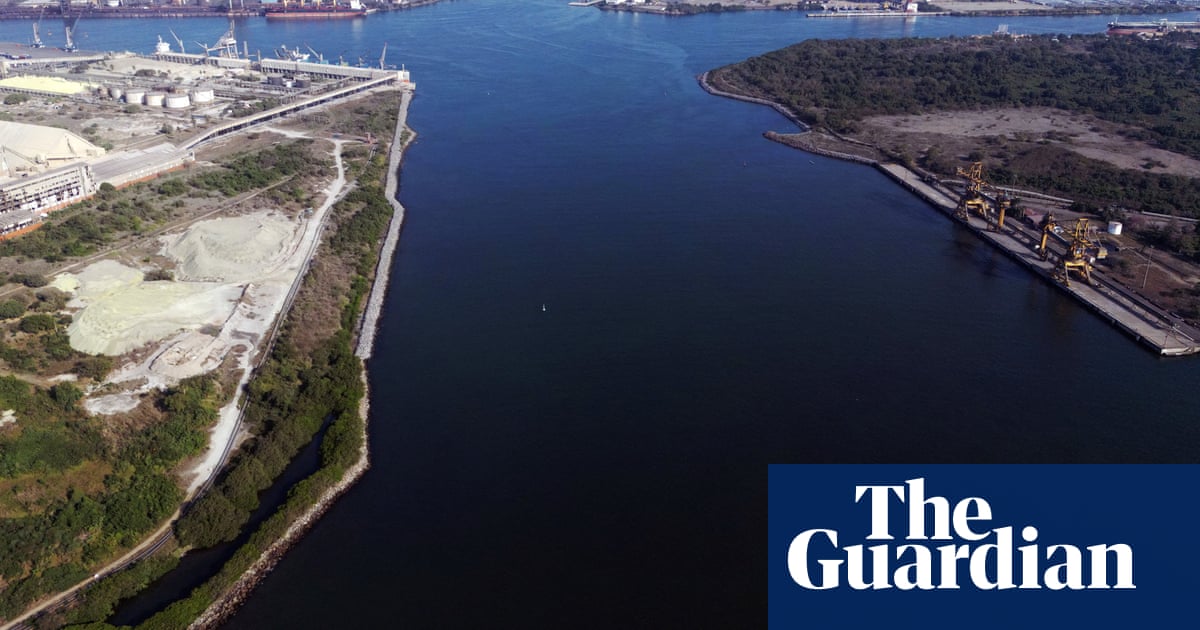Starmer claims he was ‘shocked’ by lack of coordination between police, Border Force and intelligence agencies
In his speech at the Organised Immigration Crime summit, Keir Starmer said that under the last government there was not enough coordination between the police, Border Force and the intelligence services. He said:
We inherited this total fragmentation between our policing, our Border Force and our intelligence agencies.
A fragmentation that made it crystal clear, when I looked at it, that there were gaps in our defence, an open invitation at our borders for the people smugglers to crack on.
To be honest, it should have been fixed years ago.
In his Daily Mail article, Starmer was even blunter.
We inherited the most extraordinary disconnect between policing, our Border Force and our intelligence agencies.
I was shocked. That’s why we’ve created our new £150 million Border Security Command, together with new powers and new criminal offences.

Key events
In a post on his Lawyer Writes Substack, the legal commentator Joshua Rozenberg says that emergency legislation over-ruling the Sentencing Council on the alleged “two-tier justice” guidance may have little practical impact. But it will damage government relations with the judiciary, he says. He explains:
Amending the guideline would be largely symbolic because legislation could not prevent magistrates or judges requesting pre-sentence reports for defendants in the 10 “cohorts” identified by the Sentencing Council. Equally, a sentencer may decide not to request a pre-sentence report for any offender while the full guideline remains in force if the court thinks it already has enough information about the offender and the offence.
Ministers clearly see this as a trial of strength with the judges who, by law, make up the majority of the Sentencing Council. At a superficial level it is a battle that the government will win, since the judges can be relied on to respect the sovereignty of parliament.
But at a deeper level it is a fight that will worsen relations between the executive and the judiciary. It will further damage the standing of the lord chancellor, Shabana Mahmood, among the senior judges who decided at an emergency meeting of the Sentencing Council last Tuesday evening to reject the last-minute amendments she had requested.
At the Downing Street lobby briefing the PM’s spokesperson restated the government’s refusal to rule out retaliatory tariffs against the US.
Asked about the government’s response to the threat of the UK being included in the new round of tariffs coming from President Trump this week, the spokesperson replied:
We’ve been clear that a trade war with US is not in the national interest, but we will reserve the right to respond in a way that does protect British industry once we’ve seen the detail.
And in the meantime, we’re going to continue to have these constructive discussions to agree a UK-US economic deal.
After Home Office questions in the Commons, there will be an urgent question at 3.30pm on the political situation in Bosnia-Herzegovina, followed by two statements: on the earthquake in Myanmar, and on Birmingham city council.
No 10 declines to rule out abolishing Sentencing Council – but not as part of emergency bill on alleged ‘two-tier justice’ rules
At the Downing Street lobby briefing the PM’s spokesperson said Shabana Mahmood, the justice secretary, will “shortly” give an update on the plans for emergency legislation that will allow the government to block the Sentencing Council guidance, coming into force in England and Wales tomorrow, saying judges they should normally get a pre-sentence report before sentencing people from ethnic, cultural or faith minorities.
The spokesperson said the government wanted to introduce a bill “very quickly”, but would not say how long it would take to clear the Commons and the Lords. There have been reports saying ministers would like it to become law this week.
The guidelines have been described as creating “two-tier justice”, and the spokesperson said the government was acting because it was opposed to “differential treatment” for different races and religions.
The spokesperson said the emergency legislation would focus narrowly on this issue. But he also said the government was committed to considering more broadly “the role of the Sentencing Council”, but he added: “We’re obviously not going to rush that work, and we will consider it carefully.”
Despite being asked several times, the spokesperson refused to rule out the Sentencing Council being scrapped. Asked why he was not ruling that out, the spokesperson said:
I’m just not going to get ahead of the work being done. We are not going to rush into ruling anything in or out. We need to look at the Sentencing Council and its role carefully, and any futher changes will be set out in due course.
Green party accuses Starmer of dancing ‘to Farage’s tune’, as it renews call for more safe routes for asylum seekers
The Green party has accused Keir Starmer of dancing to Nigel Farage’s tune on immigration.
In a statement released in response to Starmer’s speech this morning at the Organised Immigration Crime summit, Carla Denyer, the Green party’s co-leader, said:
The UK’s inhumane and ineffective approach to migration is costing lives, and yet Keir Starmer is choosing to dance to Nigel Farage’s tune rather than making the common sense changes needed to make the system safer and fairer.
We urgently need to introduce safe routes for people fleeing war, violence or persecution to seek safety in the UK so that people aren’t forced into the hands of people smugglers.
It’s shameful that this Labour government continues to ignore the only solution that will prevent people from dying during dangerous journeys to the UK, all because they are running scared of Farage’s Reform party.
Commenting on the Lib Dem local elections campaign launch (see 11.11am and 11.48am), Nigel Huddleston, the Conservative party co-chair, said:
The only thing serious about the Liberal Democrats is the damage they do to local services. Where they run councils, they are letting staff work part-time on full-time pay.
Only the Conservative party, under new leadership, are serious about opposing this dreadful government – and only a vote for the Conservatives on 1 May will deliver lower taxes and better services.
Keir Starmer has confirmed in comments to GB News that the government will fast-track legislation through parliament to block the Sentencing Council guidelines telling judges they should normally get a pre-sentence report before sentencing people from ethnic, cultural or faith minorities.
Here is Kiran Stacey’s story about this from yesterday.
Former Irish PM Leo Varadkar calls for Theresa May’s ‘backstop’ Brexit deal to be revived to mitigate impact of Trump tariffs

Lisa O’Carroll
Lisa O’Carroll is the Guardian’s acting Ireland correspondent.
The UK should dust down Theresa May’s Brexit “backstop” and voluntarily implement the EU’s customs laws, Ireland’s former prime minister has said, arguing that a UK/EU trade deal like this would boost trade in the face of damaging tariffs expected to be announced by Donald Trump.
Leo Varadkar said the change in America’s policy towards the EU makes a new deal an obvious solution to the UK’s growth issue.
Writing in a column in the Irish edition of the Sunday Times, he said:
Leaders could do worse than dust down a version of the “backstop” negotiated during Brexit with Theresa May as prime minister. Under this agreement, the UK would voluntarily implement the EU customs code, allowing free trade in goods between Britain and Europe again, giving Britain the boost to growth it desperately needs.
Alongside a veterinary agreement, it would remove the need for checks between Northern Ireland and the Republic of Ireland. Unionists might even support it this time. A mechanism would be needed to ensure the UK, given its size, would have a meaningful input into any common rules that it would adopt. Ireland’s farmers and traders would benefit greatly were this to happen.
The Brexit backstop was devised by May as a means of keeping the border open between Northern Ireland and Ireland and provided for a UK-wide customs union with the EU. But it was rejected in the hardline deal ultimately negotiated by her successor Boris Johnson.
Keir Starmer led a roundtable discussion joined by Home Office minister Angela Eagle, Border Security Commander Martin Hewitt and Home Office, Border Force and National Crime Agency officials at the Organised Immigration Crime summit, PA Media reports. Starmer said “serious problems” require serious solutions and there were “concrete proposals” on the table.
Ed Davey staged one of his trademark dignity-free photocalls today at the Lib Dem local elections campaign launch. At a garden in Henley, he tried his hand at hobby horsing (which apparently is an actual thing, not just a figure of speech). He was making a point about the elections being a two-horse race in many areas. He said:
In much of the country, the local elections in May are a two-horse race between the Liberal Democrats and the Conservatives. We can overtake the Conservatives as the second biggest party of local government in this election, replacing failing Conservative-run councils that take their residents for granted with Liberal Democrat ones that work hard for their local communities.
81% of voters think government handling cost of living badly, poll suggests
Around four out of five voters (81%) think the government is doing badly at managing the cost of living, according to polling by YouGov. Only 12% think it is doing well. Even among Labour supporters, people who think it is doing badly on this (67%) outnumber by three to one those who think it is doing well (22%).
YouGov also says that, on this issue, the government is seen to be doing as badly as Liz Truss was when she was in office. In his commentary for YouGov, Dylan Difford explains:
Eight in ten Britons (81%) now say the government is managing the cost of living badly, up from 74% last November. This is also the highest number saying so since August 2023 and roughly the same as the 82% who said the government was handling the cost of living badly after Liz Truss’s mini-budget in September 2022.
Just one in eight (12%) believe the government has handled the matter well, from 15% in November. This leaves a net score of -69 for the Labour government on the issue, a whole ten points lower than the -59 net score for the last Conservative government when they lost the election last July.
The Conservative party and Reform UK have both claimed that the government is failing to tackle illegal immigration.
In a statement about the Organised Immigration Crime summit, Chris Philp, the shadow home secretary, said:
The government’s plan to ‘smash the gangs’ already lies in tatters. We are about to see 30,000 illegal channel crossings since election reached this week, a 31% increase. This year so far has been the worst on record. This is a direct consequence of the government cancelling the Rwanda deterrent before it even started.
And the Reform UK MP Lee Anderson said:
Labour’s failure to control illegal migration is not just an issue of border security—it is a national crisis. As the numbers show, we are not receiving the best and brightest in terms of illegal migrants.
No country has benefited from this level of unbridled immigration. It has placed a massive strain on our public services, our safety, and the pockets of our hardworking taxpayers.
Reform UK will freeze all non-essential immigration, deport foreign criminals, and deport anyone who has illegally entered the country.
Ed Davey claims Lib Dems can replace Tories as party of Middle England
Ed Davey, the Liberal Democrat leader, has said that his party could replace the Conservatives as the party of Middle England.
In comments released ahead of his party’s local election campaign launch, Davey said:
These local elections are a chance for the Liberal Democrats to replace the Conservatives as the party of Middle England. We can overtake the Conservatives as the second biggest party of local government, replacing failing Conservative-run councils that take their residents for granted with Liberal Democrat ones that work hard for their local communities.
Liberal Democrats are now the natural home for voters disillusioned with Labour but who still haven’t forgiven the Conservatives for all the damage they did to our country.
People are deeply disappointed with Labour’s failure to deliver the change they promised and are turning to the Liberal Democrats as the party holding this government to account, from the family farm tax to winter fuel payment cuts.
Davey also also accused Kemi Badenoch of sneering at the Liberal Democrats as “the party that will fix your local church roof”, and said he was happy for his party to be seen like this.
Liberal Democrats get the job done. Kemi Badenoch may sneer at us for being the party that will fix your local church roof, but we will proudly wear that as a badge of honour. We are focused on fixing the local issues people care about, whether it’s fixing potholes, helping you see a GP or dentist, or cleaning up rivers polluted by filthy sewage.
Davey was referring to what Badenoch told Jordan Peterson in a podcast interview last month. She said:
A typical Liberal Democrat will be somebody who is good at fixing their church roof. And the people in the community like them, they are like ‘Fix the church roof, you should be a member of parliament’.
And they want to be nice. But, actually, they’ve got lots of very silly and foolish ideas, along with being able to fundraise for a local community. And then they have bad views on national security. For example, they don’t want us to keep maybe a nuclear deterrent. They have silly ideas about education. They don’t want people to go to prison. They want prisons closed down, ‘let’s just have restorative justice’ … If you’re not paying attention, you will think ‘that’s good, these are nice people, we should vote for them’, but actually they will destroy the whole country if you let them at it.
Home Office ‘very open-minded’ about whether offshore ‘return hubs’ might be good idea, minister says
Giorgia Meloni, the Italian prime minister, addressed the Organised Immigration Crime summit in a recorded video, and said she was happy to be supporting collaboration with the UK on the issue.
As PA Media reports, she said Italy’s approach with Albania to process claims offshore was first criticised but governments should not be afraid to imagine and build innovative solutions. Meloni said:
A model that was criticised at first, but that then has gained increasing consensus, so much so that today, European Union is proposing to set up return hubs in third countries.
This means that we were right and that the courage to lead the way has been rewarded.
In an interview on Times Radio this morning, asked if the government was considering using offshore “return hubs”, Angela Eagle, the border security and asylum minister, said:
We’re not ruling anything out if it works, so we’re looking at a range of things.
We’re also obviously looking to see what the European Commission is doing in Europe, we’re looking to see whether return hubs might be a good idea.
But at the moment, we’re not in a position to make any kind of announcements on that, but we are very open-minded to see what works.
In his speech at the summit, and also in his Daily Mail article, Keir Starmer used immigration policy to make a wider point about his approach to politics.
The last government’s Rwanda policy was a “gimmick”, he claimed. His approach was different, he said. Writing in the Mail, he explained:
I accept my approach is not glamorous but it’s how I do business: sleeves rolled up, getting the details right, doing the hard graft.
This plan is drawn on what I know works from my years of experience as our country’s chief prosecutor: that international co-operation is the foundation of securing Britain’s borders …
Me reeling off a list of actions isn’t what the British people are looking for. I know that. People want to know we will give them security – in their jobs, in their streets, in the promise of opportunities for their kids. I can promise we will.
It isn’t gimmicks – or more populism – that will solve this problem. It is practical government. That is the change this Labour government brings.
Kemi Badenoch also frequently describes politics in the same terms (as a split between gimmicks/presentation, and detail/planning/seriousness etc), and like Starmer she describes herself in the latter camp – but she and Starmer don’t agree on what counts as a gimmick.
Starmer claims he was ‘shocked’ by lack of coordination between police, Border Force and intelligence agencies
In his speech at the Organised Immigration Crime summit, Keir Starmer said that under the last government there was not enough coordination between the police, Border Force and the intelligence services. He said:
We inherited this total fragmentation between our policing, our Border Force and our intelligence agencies.
A fragmentation that made it crystal clear, when I looked at it, that there were gaps in our defence, an open invitation at our borders for the people smugglers to crack on.
To be honest, it should have been fixed years ago.
In his Daily Mail article, Starmer was even blunter.
We inherited the most extraordinary disconnect between policing, our Border Force and our intelligence agencies.
I was shocked. That’s why we’ve created our new £150 million Border Security Command, together with new powers and new criminal offences.
Simon Jones from BBC South East, who covers the small boat issue extensively, says on social media that, although Keir Starmer linked the latest removal numbers to potential Rwanda deportation numbers (see 9.26am), the comparision is not exact.
Labour says it’s returned 24,000 people who had no right to be here since it came to power – which it says would have taken the Rwanda scheme 80 years to achieve. (Note: Rwanda was not designed for the deportation of foreign-national offenders).










